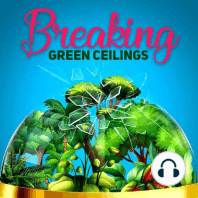43 min listen

EP 20: On Being a Black Feminist Environmental Ethnographer
EP 20: On Being a Black Feminist Environmental Ethnographer
ratings:
Length:
69 minutes
Released:
Jun 30, 2020
Format:
Podcast episode
Description
Traveling from New Jersey to North Carolina, Frances was able to experience urban city living as well as life in a rural area surrounded by hog farms. Through that, she and her family remained tight knit as her mother inspired her from all angles. With the house matriarch as a teacher and enthusiastic environmentalist, Frances was able to get the support she needed to obtain a BA in Sociology & Anthropology, Environmental Studies & Science Minor, from Spelman College, and currently working on a PhD in Society & Environment at UC Berkeley.
With her degree, she has charged into the realm of scientific research in a noble effort to make positive material changes in peoples’ lives, particularly indigenous and communities of color who have been marginalized and silenced for centuries.
Frances’ current PhD dissertation focuses on Gulf Coast women of color’s climate justice activism and strategies to resist environmental racism while navigating contradictory relationships with energy and petrochemical industries. It is titled, “Post-Apocalyptic Environmental Politics: Women of Color, Climate Justice and State-Corporate Crime in Louisiana.”
Ethnography and Climate Change
Ethnography is a branch of anthropology and the systematic study of individual cultures. In contrast with ethnology, ethnography explores cultural phenomena from the point of view of the subject of the study. Described as community based research, or participatory action research, this is a feminist research method that focuses on non-invasive and minimal-extractive methods, empowering the community to be hands on and involved in every step of the process.
Frances’ life work is shaped by environmental justice geographies including Carolina hog and chicken farms, Jersey urban landscapes, and Louisiana petrochemical-plantation corridors. She currently lives and teaches on Indigenous land known as Bulbancha (i.e. New Orleans, Louisiana) that is historically home to the Chitimacha, Choctaw, Houma, Atakapa-Ishak and various other African and Creole Indigenous peoples, which is at high risk to experience adverse climate change effects.
Other Topics
Frances is incredibly inspirational and knowledgeable. From sharing the importance of mentorship and navigating imposter syndrome, to empowering everyday people to claim the title “activist”, to describing the different impacts of climate change for different people in varying locations, this week’s episode of Breaking Green Ceilings is going to leave you motivated and inspired to do your part.
Follow Frances Roberts-Gregory
Website
LinkedIn
Instagram
Related Resources
On Being the (Only) Black Feminist Environmental Ethnographer in Gulf Coast Louisiana
I do not drive in the South…And here’s why
Diversity and Environmental Grantmakers: A Summer Love Story
With her degree, she has charged into the realm of scientific research in a noble effort to make positive material changes in peoples’ lives, particularly indigenous and communities of color who have been marginalized and silenced for centuries.
Frances’ current PhD dissertation focuses on Gulf Coast women of color’s climate justice activism and strategies to resist environmental racism while navigating contradictory relationships with energy and petrochemical industries. It is titled, “Post-Apocalyptic Environmental Politics: Women of Color, Climate Justice and State-Corporate Crime in Louisiana.”
Ethnography and Climate Change
Ethnography is a branch of anthropology and the systematic study of individual cultures. In contrast with ethnology, ethnography explores cultural phenomena from the point of view of the subject of the study. Described as community based research, or participatory action research, this is a feminist research method that focuses on non-invasive and minimal-extractive methods, empowering the community to be hands on and involved in every step of the process.
Frances’ life work is shaped by environmental justice geographies including Carolina hog and chicken farms, Jersey urban landscapes, and Louisiana petrochemical-plantation corridors. She currently lives and teaches on Indigenous land known as Bulbancha (i.e. New Orleans, Louisiana) that is historically home to the Chitimacha, Choctaw, Houma, Atakapa-Ishak and various other African and Creole Indigenous peoples, which is at high risk to experience adverse climate change effects.
Other Topics
Frances is incredibly inspirational and knowledgeable. From sharing the importance of mentorship and navigating imposter syndrome, to empowering everyday people to claim the title “activist”, to describing the different impacts of climate change for different people in varying locations, this week’s episode of Breaking Green Ceilings is going to leave you motivated and inspired to do your part.
Follow Frances Roberts-Gregory
Website
Related Resources
On Being the (Only) Black Feminist Environmental Ethnographer in Gulf Coast Louisiana
I do not drive in the South…And here’s why
Diversity and Environmental Grantmakers: A Summer Love Story
Released:
Jun 30, 2020
Format:
Podcast episode
Titles in the series (63)
EP 12: Getting People to Care About the Environment by Breaking Green Ceilings